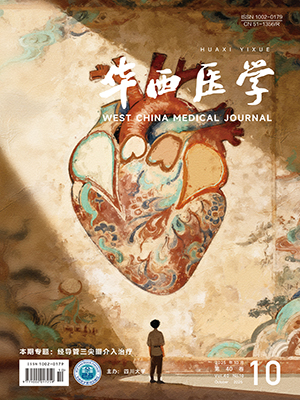| 1. |
Jin Z, Hu J, Ma D. Postoperative delirium: perioperative assessment, risk reduction, and management. Br J Anaesth, 2020, 125(4): 492-504.
|
| 2. |
Bellelli G, Brathwaite JS, Mazzola P. Delirium: a marker of vulnerability in older people. Front Aging Neurosci, 2021, 13: 626127.
|
| 3. |
Subramaniyan S, Terrando N. Neuroinflammation and perioperative neurocognitive disorders. Anesth Analg, 2019, 128(4): 781-788.
|
| 4. |
Zhang Y, Baldyga K, Dong Y, et al. The association between gut microbiota and postoperative delirium in patients. Transl Psychiatry, 2023, 13(1): 156.
|
| 5. |
Zhang J, Bi JJ, Guo GJ, et al. Abnormal composition of gut microbiota contributes to delirium-like behaviors after abdominal surgery in mice. CNS Neurosci Ther, 2019, 25(6): 685-696.
|
| 6. |
Liu H, Cheng G, Xu YL, et al. Preoperative status of gut microbiota predicts postoperative delirium in patients with gastric cancer. Front Psychiatry, 2022, 13: 852269.
|
| 7. |
Yang L, Ding W, Dong Y, et al. Electroacupuncture attenuates surgical pain-induced delirium-like behavior in mice via remodeling gut microbiota and dendritic spine. Front Immunol, 2022, 13: 955581.
|
| 8. |
Yang Z, Tong C, Qian X, et al. Mechanical bowel preparation is a risk factor for postoperative delirium as it alters the gut microbiota composition: a prospective randomized single-center study. Front Aging Neurosci, 2022, 14: 847610.
|
| 9. |
Lu J, Hou W, Gao S, et al. The role of gut microbiota-gut-brain axis in perioperative neurocognitive dysfunction. Front Pharmacol, 2022, 13: 879745.
|
| 10. |
Jiang XL, Gu XY, Zhou XX, et al. Intestinal dysbacteriosis mediates the reference memory deficit induced by anaesthesia/surgery in aged mice. Brain Behav Immun, 2019, 80: 605-615.
|
| 11. |
Shin NR, Whon TW, Bae JW. Proteobacteria: microbial signature of dysbiosis in gut microbiota. Trends Biotechnol, 2015, 33(9): 496-503.
|
| 12. |
Dong L, Li J, Zhang C, et al. Gut microbiota: a new player in the pathogenesis of perioperative neurocognitive disorder?. Ibrain, 2021, 7(1): 37-43.
|
| 13. |
Martin-Gallausiaux C, Marinelli L, Blottière HM, et al. SCFA: mechanisms and functional importance in the gut. Proc Nutr Soc, 2021, 80(1): 37-49.
|
| 14. |
Li X, Wang G, He Y, et al. White-cell derived inflammatory biomarkers in prediction of postoperative delirium in elderly patients undergoing surgery for lower limb fracture under non-general anaesthesia. Clin Interv Aging, 2022, 17: 383-392.
|
| 15. |
Roh JS, Sohn DH. Damage-associated molecular patterns in inflammatory diseases. Immune Netw, 2018, 18(4): e27.
|
| 16. |
Ahmad MA, Kareem O, Khushtar M, et al. Neuroinflammation: a potential risk for dementia. Int J Mol Sci, 2022, 23(2): 616.
|
| 17. |
Lederer AK, Pisarski P, Kousoulas L, et al. Postoperative changes of the microbiome: are surgical complications related to the gut flora? A systematic review. BMC Surg, 2017, 17(1): 125.
|
| 18. |
Wen Y, Feng S, Dai H, et al. Intestinal dysbacteriosis-propelled T helper 17 cells activation mediate the perioperative neurocognitive disorder induced by anesthesia/surgery in aged rats. Neurosci Lett, 2022, 783: 136741.
|
| 19. |
Pellegrini C, Antonioli L, Calderone V, et al. Microbiota-gut-brain axis in health and disease: is NLRP3 inflammasome at the crossroads of microbiota-gut-brain communications?. Prog Neurobiol, 2020, 191: 101806.
|
| 20. |
Han S, Bian R, Chen Y, et al. Dysregulation of the gut microbiota contributes to sevoflurane-induced cognitive dysfunction in aged mice by activating the NLRP3 inflammasome. Mol Neurobiol, 2024, 61(12): 10500-10516.
|
| 21. |
Safavynia SA, Goldstein PA. The role of neuroinflammation in postoperative cognitive dysfunction: moving from hypothesis to treatment. Front Psychiatry, 2018, 9: 752.
|
| 22. |
Okonogi T, Kuga N, Yamakawa M, et al. Stress-induced vagal activity influences anxiety-relevant prefrontal and amygdala neuronal oscillations in male mice. Nat Commun, 2024, 15(1): 183.
|
| 23. |
Sun Y, Wang X, Li L, et al. The role of gut microbiota in intestinal disease: from an oxidative stress perspective. Front Microbiol, 2024, 15: 1328324.
|
| 24. |
Kunst C, Schmid S, Michalski M, et al. The influence of gut microbiota on oxidative stress and the immune system. Biomedicines, 2023, 11(5): 1388.
|
| 25. |
Zhang J, Gao J, Guo G, et al. Anesthesia and surgery induce delirium-like behavior in susceptible mice: the role of oxidative stress. Am J Transl Res, 2018, 10(8): 2435-2444.
|
| 26. |
Zuo CL, Wang CM, Liu J, et al. Isoflurane anesthesia in aged mice and effects of A1 adenosine receptors on cognitive impairment. CNS Neurosci Ther, 2018, 24(3): 212-221.
|
| 27. |
Xie Z, Swain CA, Ward SA, et al. Preoperative cerebrospinal fluid β-amyloid/tau ratio and postoperative delirium. Ann Clin Transl Neurol, 2014, 1(5): 319-328.
|
| 28. |
Zhang J, Zhu S, Jin P, et al. Graphene oxide improves postoperative cognitive dysfunction by maximally alleviating amyloid beta burden in mice. Theranostics, 2020, 10(26): 11908-11920.
|
| 29. |
Kowalski K, Mulak A. Brain-gut-microbiota axis in Alzheimer’s disease. J Neurogastroenterol Motil, 2019, 25(1): 48-60.
|
| 30. |
Cho JH, Chae CW, Lim JR, et al. Sodium butyrate ameliorates high glucose-suppressed neuronal mitophagy by restoring PRKN expression via inhibiting the RELA-HDAC8 complex. Autophagy, 2024, 20(7): 1505-1522.
|
| 31. |
Liu X, Du ZR, Wang X, et al. Colonic dopaminergic neurons changed reversely with those in the midbrain via gut microbiota-mediated autophagy in a chronic Parkinson’s disease mice model. Front Aging Neurosci, 2021, 13: 649627.
|
| 32. |
Dalile B, Van Oudenhove L, Vervliet B, et al. The role of short-chain fatty acids in microbiota-gut-brain communication. Nat Rev Gastroenterol Hepatol, 2019, 16(8): 461-478.
|
| 33. |
Feng Y, Wang Y, Wang P, et al. Short-chain fatty acids manifest stimulative and protective effects on intestinal barrier function through the inhibition of NLRP3 inflammasome and autophagy. Cell Physiol Biochem, 2018, 49(1): 190-205.
|
| 34. |
Brunt VE, LaRocca TJ, Bazzoni AE, et al. The gut microbiome-derived metabolite trimethylamine N-oxide modulates neuroinflammation and cognitive function with aging. Geroscience, 2021, 43(1): 377-394.
|
| 35. |
Arrona Cardoza P, Spillane MB, Morales Marroquin E. Alzheimer’s disease and gut microbiota: does trimethylamine N-oxide (TMAO) play a role?. Nutr Rev, 2022, 80(2): 271-281.
|
| 36. |
Lu X, Xue Z, Qian Y, et al. Changes in intestinal microflora and its metabolites underlie the cognitive impairment in preterm rats. Front Cell Infect Microbiol, 2022, 12: 945851.
|
| 37. |
Moss DE. Improving anti-neurodegenerative benefits of acetylcholinesterase inhibitors in Alzheimer’s disease: are irreversible inhibitors the future?. Int J Mol Sci, 2020, 21(10): 3438.
|
| 38. |
Yang X, Chen X. The crosstalk between the blood-brain barrier dysfunction and neuroinflammation after general anaesthesia. Curr Issues Mol Biol, 2022, 44(11): 5700-5717.
|
| 39. |
Yang X, Yu D, Xue L, et al. Probiotics modulate the microbiota-gut-brain axis and improve memory deficits in aged SAMP8 mice. Acta Pharm Sin B, 2020, 10(3): 475-487.
|
| 40. |
Dodiya HB, Forsyth CB, Voigt RM, et al. Chronic stress-induced gut dysfunction exacerbates Parkinson’s disease phenotype and pathology in a rotenone-induced mouse model of Parkinson’s disease. Neurobiol Dis, 2020, 135: 104352.
|
| 41. |
Liu F, Duan M, Fu H, et al. Orthopedic surgery causes gut microbiome dysbiosis and intestinal barrier dysfunction in prodromal alzheimer disease patients: a prospective observational cohort study. Ann Surg, 2022, 276(2): 270-280.
|
| 42. |
Huang X, Hussain B, Chang J. Peripheral inflammation and blood-brain barrier disruption: effects and mechanisms. CNS Neurosci Ther, 2021, 27(1): 36-47.
|
| 43. |
Terrando N, Akassoglou K. Breaking barriers in postoperative delirium. Br J Anaesth, 2022, 129(2): 147-150.
|
| 44. |
Minerbi A, Shen S. Gut microbiome in anesthesiology and pain medicine. Anesthesiology, 2022, 137(1): 93-108.
|
| 45. |
Mao L, Zeng Q, Su W, et al. Elevation of miR-146a inhibits BTG2/BAX expression to ameliorate postoperative cognitive dysfunction following probiotics (VSL#3) Treatment. Mol Neurobiol, 2021, 58(7): 3457-3470.
|
| 46. |
Liufu N, Liu L, Shen S, et al. Anesthesia and surgery induce age-dependent changes in behaviors and microbiota. Aging (Albany NY), 2020, 12(2): 1965-1986.
|
| 47. |
Wang P, Yin X, Chen G, et al. Perioperative probiotic treatment decreased the incidence of postoperative cognitive impairment in elderly patients following non-cardiac surgery: a randomised double- blind and placebo-controlled trial. Clin Nutr, 2021, 40(1): 64-71.
|
| 48. |
Yuan Q, Xin L, Han S, et al. Lactulose improves neurological outcomes by repressing harmful bacteria and regulating inflammatory reactions in mice after stroke. Front Cell Infect Microbiol, 2021, 11: 644448.
|
| 49. |
Yang XD, Wang LK, Wu HY, et al. Effects of prebiotic galacto-oligosaccharide on postoperative cognitive dysfunction and neuroinflammation through targeting of the gut-brain axis. BMC Anesthesiol, 2018, 18(1): 177.
|
| 50. |
Rao J, Qiao Y, Xie R, et al. Fecal microbiota transplantation ameliorates stress-induced depression-like behaviors associated with the inhibition of glial and NLRP3 inflammasome in rat brain. J Psychiatr Res, 2021, 137: 147-157.
|
| 51. |
Cheng Y, Tan G, Zhu Q, et al. Efficacy of fecal microbiota transplantation in patients with Parkinson’s disease: clinical trial results from a randomized, placebo-controlled design. Gut microbes, 2023, 15(2): 2284247.
|
| 52. |
Pan C, Zhang H, Zhang L, et al. Surgery-induced gut microbial dysbiosis promotes cognitive impairment via regulation of intestinal function and the metabolite palmitic amide. Microbiome, 2023, 11(1): 248.
|
| 53. |
Lowe PP, Gyongyosi B, Satishchandran A, et al. Reduced gut microbiome protects from alcohol-induced neuroinflammation and alters intestinal and brain inflammasome expression. J Neuroinflammation, 2018, 15(1): 298.
|
| 54. |
Liang P, Shan W, Zuo Z. Perioperative use of cefazolin ameliorates postoperative cognitive dysfunction but induces gut inflammation in mice. J Neuroinflammation, 2018, 15(1): 235.
|
| 55. |
Luo A, Li S, Wang X, et al. Cefazolin improves anesthesia and surgery-induced cognitive impairments by modulating blood-brain barrier function, gut bacteria and short chain fatty acids. Front Aging Neurosci, 2021, 13: 748637.
|
| 56. |
Wang G, Zhou H, Zhang L, et al. Effects of high-intensity interval training on gut microbiota profiles in 12 months’ old ICR mice. J Physiol Biochem, 2020, 76(4): 539-548.
|
| 57. |
Zhu B, Zhou Y, Zhou W, et al. Electroacupuncture modulates gut microbiota in mice: a potential target in postoperative cognitive dysfunction. Anat Rec (Hoboken), 2023, 306(12): 3131-3143.
|
| 58. |
Wang XQ, Li H, Li XN, et al. Gut-brain axis: possible role of gut microbiota in perioperative neurocognitive disorders. Front Aging Neurosci, 2021, 13: 745774.
|
| 59. |
李增亮, 要旗, 张开元, 等. 肠道菌群在脓毒症发生发展中的作用及其治疗潜力. 医学新知, 2024, 34(12): 1417-1423.
|
| 60. |
赵宇婷, 杨宇晨, 蔡智慧. 肠道菌群对乳腺癌化疗疗效及相关不良反应的影响概述. 药物流行病学杂志, 2025, 34(1): 94-98.
|




